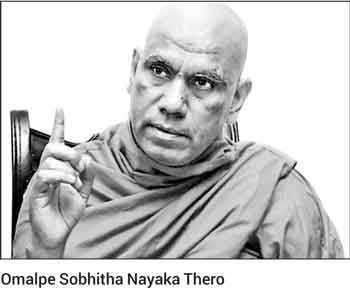Wednesday Feb 25, 2026
Wednesday Feb 25, 2026
Saturday, 14 December 2019 00:02 - - {{hitsCtrl.values.hits}}
 Last week we featured a segment of the deliberations made at the RASL symposium, focusing on Indigenous Medicine, Health Care and Wellbeing. Today we feature some of the points made by Omalpe Sobhitha Nayaka Thero at the RASL symposium, on ‘Food Ethics and Conscious Eating’.
Last week we featured a segment of the deliberations made at the RASL symposium, focusing on Indigenous Medicine, Health Care and Wellbeing. Today we feature some of the points made by Omalpe Sobhitha Nayaka Thero at the RASL symposium, on ‘Food Ethics and Conscious Eating’.
Based on the Buddhist tradition of consciousness, the presentation by the Thero belongs in the curricula’s of every school, university and Daham Pasala.
At a time and age where poison is eaten in the name of taste, and parents spend exorbitant amounts to take their children to fancy eateries of foreign origin, his emphasis, keeping in mind the Buddhist philosophy of mindfulness and awareness in all matters of life and the tradition of eating, was that food should be consumed for the sole purpose of keeping the body alive and healthy.
“If you do not consider food as medicine in your diet then one day you will have to consume medicine as food,” the Thero pointed out.
In an interesting linguistic analysis he explained that the correct word, in the Sinhala language, to describe consuming food with awareness and compassion, for the purpose of sustaining human life, is ‘walandanawa,’ noting that there is no English equivalent. He emphasised that partaking of the death of a life, killed on one’s behalf, to sustain one’s own body, has no place in the concept of mindful and compassionate consumption and that such consumption is not conducive to human health.
It was explained by the Thero that the modern consumption pattern is decreed by the opposite of consciousness, where taste and addictions are promoted with no hesitation and poisons added freely, again with no hesitation for a non-conscious public to consume and readily reach the state of ‘dis-ease.’
“Today the whole country is a sick lament. Children are dying before their parents. Diseases like Cancer are rampant in this country, that humans should never get if they ate what they should,” the Omalpe Sobhitha Nayaka Thero said.
The Thero’s comments can be measured in the backdrop of the heinous crime of factory farming where we consume life reared just for death and where, if one takes factory farmed chickens, the carcass that we tackle on our plate has been fed and injected with substance that should not be in the body of any living being.
The Thero also focused on the socio-economic impact of illness within a family, where family members sell their property and go through utmost hardship to find cures for diseases such as cancer.